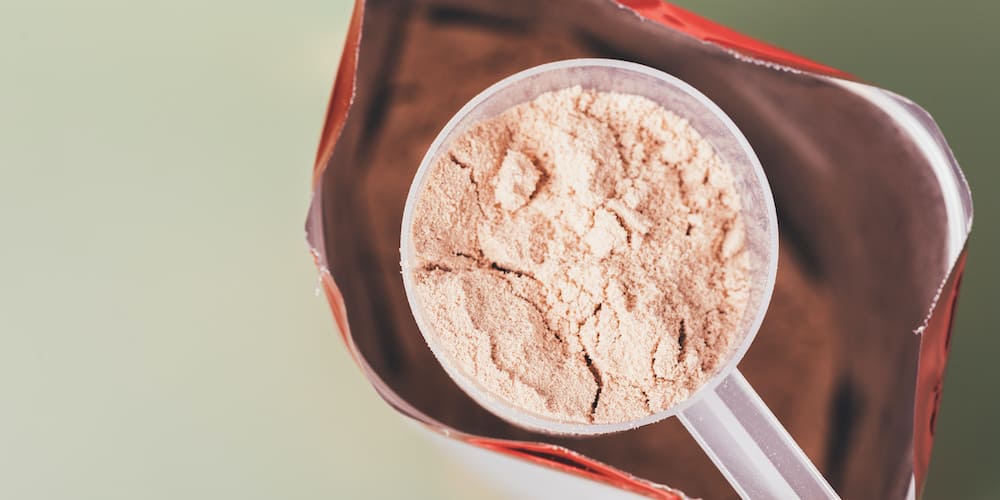Often, weight gain is the result of an energy imbalance: when the calorie intake exceeds the expenditure, the body stores it.
This implies an increase in fat mass. However, it is also possible to develop muscle mass, which is physiologically very different.
Weight gain and muscle hypertrophy are therefore two situations that need to be well distinguished.
Another essential point, not all calories are equal. The body doesn’t use lipids, carbohydrates, or proteins in the same way. To know if whey makes you gain weight, it is ultimately the whole range of eating habits that need to be observed. I’ll explain.
📚 Read also | What are the 4 best whey isolates?
The links between whey supplementation and body weight gain
Whey is low in sugars and fats
I advise you to choose whey isolate, which is less rich in sugar, or hydrolysate. More concentrated in proteins, they generally digest better than other protein powders.
Indeed, these wheys are low in lactose, avoiding the sensation of bloating. They are also more quickly absorbed: between 20 to 30 minutes.
Another advantage is that whey is also low in fat. The whey (milk serum) they come from is naturally low in lipids.
On average, anticipate between 100 and 120 calories per whey shake, with less than 2 g of carbohydrates per serving. This is not a very high energy intake in itself.
Unlike some high-protein, high-energy foods like fatty fish, nuts, legumes, whey allows increasing proteins while limiting calories.
I take whey and I have gained weight
If you are gaining weight with whey, question your eating habits and sensations. Are you eating more? Do you have an increased appetite? Are you working out less?
No single food or nutrient causes weight gain absolutely. Ultimately, what matters is your overall diet. If your diet is high-calorie, adding whey won’t make you gain more weight, nor lose it.
With appropriate workouts what can happen is: gaining muscle without losing fat, thus showing a higher weight on the scale.
In reality, you are not getting fatter. It’s about muscle anabolism, whether you consume whey or not.
Another possible situation: losing fat while gaining muscle thanks to whey and appropriate workouts. Not much changes on the scale in terms of weight, yet the physical and health results are real!
Does whey make your belly fat?
Another question I often hear from athletes I follow: Does whey make your belly fat?
It turns out that whey consumption in athletes could actually help lose more abdominal fat according to this study.
The right amount of whey per day
To meet your needs, start by evaluating the amount of protein you require.
For example: you weigh 80 kilos. Calculate: 80 x 1.6 g = 128 g of protein per day. Knowing that 1 whey shake provides 25 g of protein on average, two per day will already provide 50 g of protein.
By integrating 2 eggs with nuts in the morning, a portion of meat or fish at lunch and dinner, then plain skyr as dessert, your recommended daily protein amount is reached.

The links between proteins and body weight
Calories from proteins
Among the three essential nutrients, lipids are the most energetic: 1 g releases 9 calories. Whereas 1 g of protein releases 4 kcal, the same as carbohydrates.
The roles of proteins are multiple: they allow the creation of muscles, skin, hair, nails, and balance the nitrogen balance. They are the base of all cellular life: enzyme, hormone, antibody.
Eating proteins every day is therefore essential! Animal and plant proteins release amino acids, some of which are essential that the body cannot manufacture on its own.
To digest, absorb, and transport them, they force the body to expend a lot of energy. They are the macronutrient with the highest thermal cost.
The right amount of protein per day
The recommendations for adults are about 0.8 g of protein per kilogram of body weight per day, which is roughly 15% of the total daily energy.
When regularly engaging in sports or during weight loss, protein needs can rise to 1.6 g per kg of body weight per day.
This corresponds to 20-30% of protein per day, which is higher than the recommendations of the ANSES.
Too much protein
Unlike carbohydrates and fats, an excess of protein does not accumulate as fat.
Eating too much protein can cause acidification of the body leading to bone disorders, water retention, and kidney issues.
Therefore, it is advisable to stay consistent with your daily intake. Overusing whey shakes will not be more effective for weight loss or muscle gain.
Not enough protein
Conversely, lack of protein urges the body to draw from muscle reserves to make its own proteins. Fatigue, hair loss, immune deficiency…
Researchers have highlighted that not eating enough protein could lead to eating more calories and promoting weight gain.
Know that you can also take protein shakes without being an athlete for additional protein intake and to meet your needs.
For example, you can incorporate whey as a slimming snack in the morning, instead of a sugar-rich pastry that often leaves you hungry a few hours later.
If you like to snack in the afternoon, try a whey-based recipe like a high-protein pancake.
Feel free to consult a dietitian who can help you find the right balance. Whey has no reason to cause weight gain in itself and, above all, weight as a sole indicator is not enough.
📚 Read also | A dietitian tested 12 brands of whey protein, here are the results
Sources and scientific studies
V A Aparicio, E Nebot, R García-del Moral, M Machado-Vílchez, J M Porres, C Sánchez, P Aranda – High-protein diets and renal status in rats, 2013
Juha J Hulmi, Mia Laakso, Antti A Mero, Keijo Häkkinen, Juha P Ahtiainen, Heikki Peltonen – The effects of whey protein with or without carbohydrates on resistance training adaptations, 2015
Anna R Ogilvie, Yvette Schlussel, Deeptha Sukumar, Lingqiong Meng, Sue A Shapses – Higher protein intake during caloric restriction improves diet quality and attenuates loss of lean body mass, 2022



